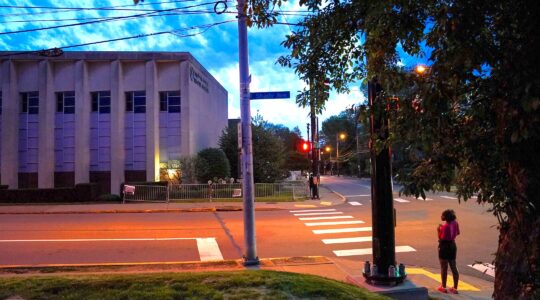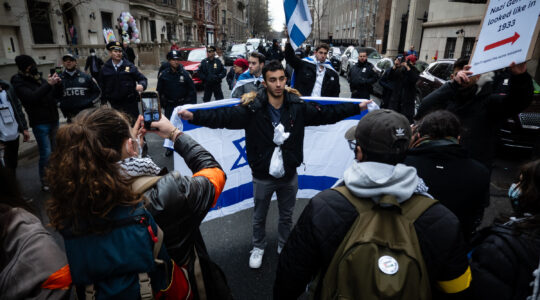JERUSALEM (JTA) – An Israeli couple who blog about terrorism have achieved international fame – and a bit of notoriety – by setting off a “dirty bomb” scare in New York City.
The brouhaha began last week with a report on DEBKAfile – the 7-year-old Web site operated from the Jerusalem home of veteran journalists Giora Shamis and Diane Shalem – asserting that al-Qaida had vowed on the Internet to plant a “dirty bomb” in New York.
It seemed like a standard posting for the site (debka.com), which claims to attract hundreds of thousands of daily users with its potpourri of Hebrew and English alerts, predictions and analyses focused mainly on potential Islamist threats and the West’s military counter campaigns.
This time, however, it wasn’t just news junkies paying attention.
Prompted at least in part by the Debka report, New York City officials went on high alert, and the city’s Police Department set up checkpoints around lower Manhattan and deployed radiological monitoring equipment on land vehicles, boats and helicopters.
Nothing untoward transpired, and city officials made clear that they had responded to a vague tip.
“These actions are like those that the NYPD takes every day – precautions against potential but unconfirmed threats that may never materialize,” Mayor Michael Bloomberg said in a statement.
Mainstream media frequently write off Debka – the word refers to an Arab folk dance – as a fringe outfit catering to conspiracy theorists. But the recent episode marked the second time in recent months that the site caused a stir in more mainstream circles.
In June, following what quickly proved to be a false report in Debka, The Associated Press and Reuters filed news stories incorrectly suggesting that Turkish forces were now operating inside northern Iraq.
Critics claim the site, which often relies on anonymous sources, relies on information from parties with an agenda.
“DEBKAfile has frequently promulgated materials put out by rightist elements of the Republican Party, whose worldview is that the situation is bad and is only going to get worse,” Yediot Achronot investigative reporter Ronen Bergman wrote.
Bergman said Israeli intelligence officials do not consider even 10 percent of the site’s content to be reliable, and that the New York alert suggested U.S. authorities, still reeling from the Sept. 11, 2001 attacks, wanted “ass-cover” lest disaster strike again.
But Shamis and Shalem, both of whom worked for more than 20 years covering foreign policy and intelligence issues for the London-based Economist, have said that 80 percent of what Debka reports turns out to be true.
The site predicted in 2000 that al-Qaida, having tried to blow up the World Trade Center in the 1990s, would strike the landmark again.
It also predicted the second intifada, the Palestinian uprising, and warned well before last summer’s war in Lebanon that Hezbollah had amassed 12,000 Katyusha rockets that were pointed at northern Israel.
Shamis voiced surprise at the New York alert.
“We did not think it would make such a stir,” he told the Ma’ariv newspaper. “This is the first time that a Debka story prompts a security alert in the United States.”
In an Aug. 9 posting, Debka reported that its analysts had picked up an al-Qaida pledge over the Internet to strike “by means of trucks loaded with radioactive material against America’s biggest city and financial nerve center.” The report also mentioned Miami and Los Angeles as potential targets.
A day later New York police kicked into action, with police officials reportedly saying that the measures were in response to the Debka report.
Shalem told JTA she was “absolutely sure that we were only one source” in the decision by the New York authorities to go on alert. “They took the tip from us” and thought it was serious enough to check it out, she said.
In a post on Monday, the Web site declared that “the chatter continues” and said that the New York police had come up “with a further piece of information which was not sourced to DEBKA suggesting that a dirty bomb may go off on Friday evening around 34th Street in Manhattan, where the Empire State Building, Madison Square Garden and Macy’s department store are located.”
Debka proceeded on its Web site to slam its critics, complaining of “unbridled, gratuitous assaults on this publication’s credibility from the publications which missed the story, prominently Associated Press, the International Herald Tribune and FoxNews.”
Shalem said the Israeli media in particular “is hostile because we scoop them.”
Like any journalistic enterprise, Debka doesn’t always get it right, Shalem acknowledged, noting the corrections and clarifications found daily in major newspapers.
“What we’re doing is not scientific,” she said. “We specialize in looking a little bit ahead. We don’t claim to be prophets, but we are taking much more of a risk. Most of the time we are justified,” she said in a telephone interview from Jerusalem.
In the Monday post, Debka claimed credit for exposing al-Qaida’s efforts to recruit followers to fight in Iraq and set up networks in Egypt and Gaza. “Had the powers-that-be responded in timely fashion to these advance alerts,” Debka stated, the situation in these areas “might have evolved differently.”
Shalem said they have 11 reporters stationed around the world. They have followed al-Qaida since 1988, she said, using analysts trolling the Web for “chatter” from al-Qaida sympathizers that could provide details on upcoming attacks.
Debka is free, making its money from advertising, though it also provides special e-mail bulletins for paying customers.
Shalem said they named their enterprise Debka because the dance, popular all over the Middle East, including Israel, is done differently in different countries. The same is true of one’s perspective on the world, she said.
“Take the Iraq war and how differently it’s perceived in Saudi Arabia, Morocco and Washington,” she said. The nuances are very important.”
One expert criticized the notion of New York police responding solely to a Debka report; another rejected it.
“I don’t take Debka seriously as a reliable source,” Boaz Ganor, an Israeli anti-terror expert, said in an interview with The Associated Press. “But,” he added later, “there are people who take it seriously and that’s what makes it dangerous.”
Paul Goldenberg, national director of a security network that services American Jewish organizations, described the New York Police Department’s intelligence-gathering operation as top notch and said it was impossible that the force would respond solely on the basis of a Debka report.
As for his operation, known as SCAN: The Secure Community Network, Goldenberg said it would only issue warnings or take other steps after consulting with government agencies.
In general, Goldenberg said, Internet users need to understand that privately operated Web sites are often less reliable than official government sources.
“The information should not be taken as 100 percent factual,” said Goldenberg, who in the 1980s headed up an intelligence unit in the New Jersey Attorney General’s Office.
That said, Goldenberg added, several private organizations – including the Anti-DefamationLeague, journalist Steve Emerson’s Investigative Project and MEMRI, a group that translates media reports from the Arab and Muslim worlds into various languages – maintain longstanding relations with law enforcement agencies and have proven to be valuable sources of information.
(JTA editor Lisa Hostein and managing editor Ami Eden in New York contributed to this report.)
JTA has documented Jewish history in real-time for over a century. Keep our journalism strong by joining us in supporting independent, award-winning reporting.





